The Intel Comet Lake Core i9-10900K, i7-10700K, i5-10600K CPU Review: Skylake We Go Again
by Dr. Ian Cutress on May 20, 2020 9:00 AM EST- Posted in
- CPUs
- Intel
- Skylake
- 14nm
- Z490
- 10th Gen Core
- Comet Lake
CPU Performance: Web and Legacy Tests
While more the focus of low-end and small form factor systems, web-based benchmarks are notoriously difficult to standardize. Modern web browsers are frequently updated, with no recourse to disable those updates, and as such there is difficulty in keeping a common platform. The fast paced nature of browser development means that version numbers (and performance) can change from week to week. Despite this, web tests are often a good measure of user experience: a lot of what most office work is today revolves around web applications, particularly email and office apps, but also interfaces and development environments. Our web tests include some of the industry standard tests, as well as a few popular but older tests.
We have also included our legacy benchmarks in this section, representing a stack of older code for popular benchmarks.
All of our benchmark results can also be found in our benchmark engine, Bench.
Speedometer 2: JavaScript Frameworks
Our newest web test is Speedometer 2, which is a accrued test over a series of javascript frameworks to do three simple things: built a list, enable each item in the list, and remove the list. All the frameworks implement the same visual cues, but obviously apply them from different coding angles.
Our test goes through the list of frameworks, and produces a final score indicative of ‘rpm’, one of the benchmarks internal metrics. We report this final score.
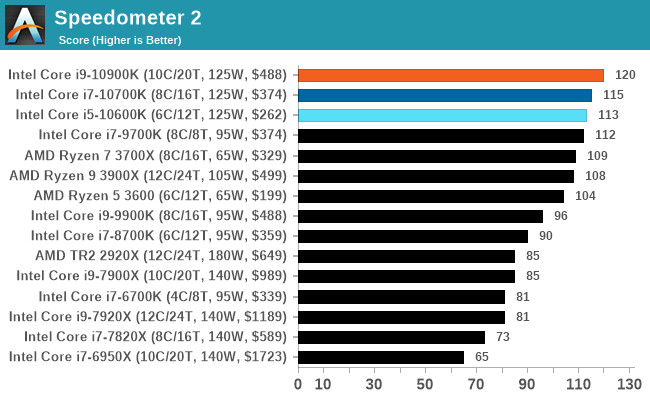
Google Octane 2.0: Core Web Compute
A popular web test for several years, but now no longer being updated, is Octane, developed by Google. Version 2.0 of the test performs the best part of two-dozen compute related tasks, such as regular expressions, cryptography, ray tracing, emulation, and Navier-Stokes physics calculations.
The test gives each sub-test a score and produces a geometric mean of the set as a final result. We run the full benchmark four times, and average the final results.
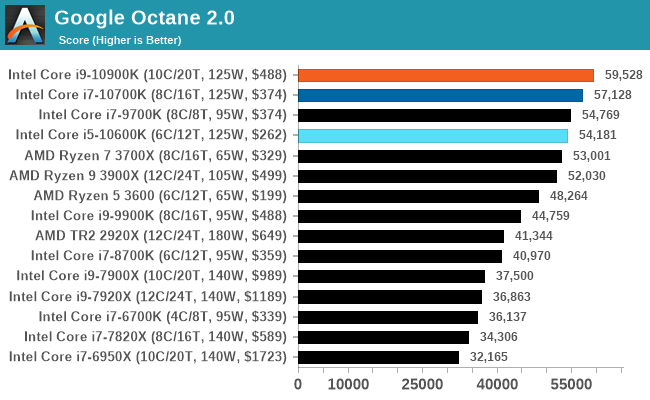
Mozilla Kraken 1.1: Core Web Compute
Even older than Octane is Kraken, this time developed by Mozilla. This is an older test that does similar computational mechanics, such as audio processing or image filtering. Kraken seems to produce a highly variable result depending on the browser version, as it is a test that is keenly optimized for.
The main benchmark runs through each of the sub-tests ten times and produces an average time to completion for each loop, given in milliseconds. We run the full benchmark four times and take an average of the time taken.
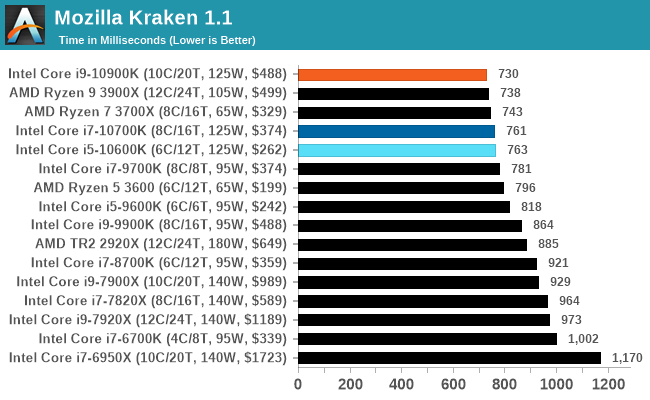
3DPM v1: Naïve Code Variant of 3DPM v2.1
The first legacy test in the suite is the first version of our 3DPM benchmark. This is the ultimate naïve version of the code, as if it was written by scientist with no knowledge of how computer hardware, compilers, or optimization works (which in fact, it was at the start). This represents a large body of scientific simulation out in the wild, where getting the answer is more important than it being fast (getting a result in 4 days is acceptable if it’s correct, rather than sending someone away for a year to learn to code and getting the result in 5 minutes).
In this version, the only real optimization was in the compiler flags (-O2, -fp:fast), compiling it in release mode, and enabling OpenMP in the main compute loops. The loops were not configured for function size, and one of the key slowdowns is false sharing in the cache. It also has long dependency chains based on the random number generation, which leads to relatively poor performance on specific compute microarchitectures.
3DPM v1 can be downloaded with our 3DPM v2 code here: 3DPMv2.1.rar (13.0 MB)
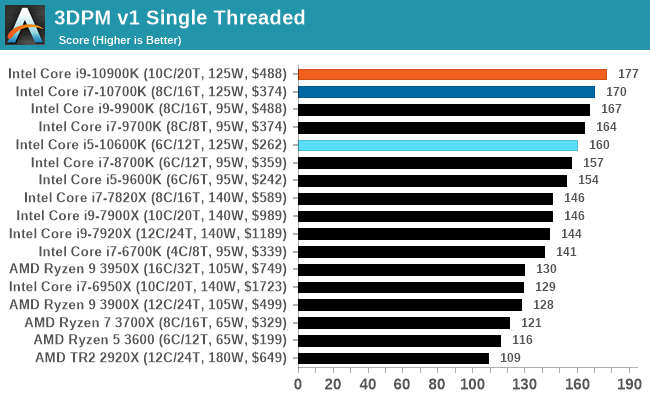
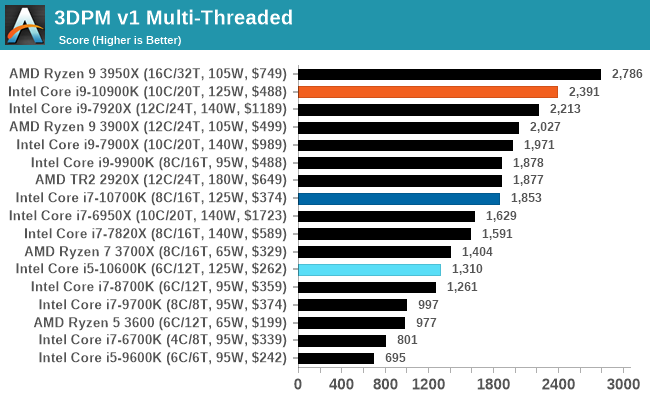
x264 HD 3.0: Older Transcode Test
This transcoding test is super old, and was used by Anand back in the day of Pentium 4 and Athlon II processors. Here a standardized 720p video is transcoded with a two-pass conversion, with the benchmark showing the frames-per-second of each pass. This benchmark is single-threaded, and between some micro-architectures we seem to actually hit an instructions-per-clock wall.
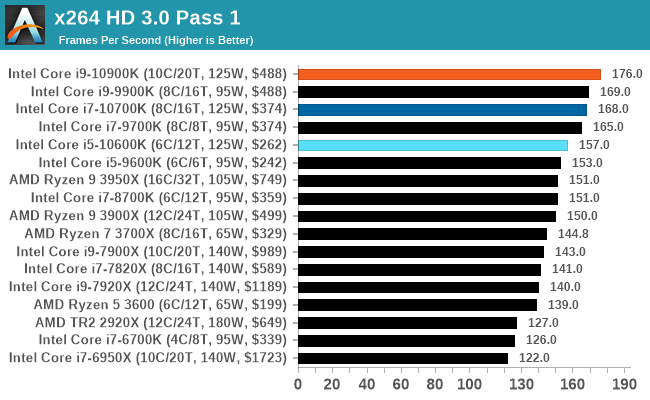
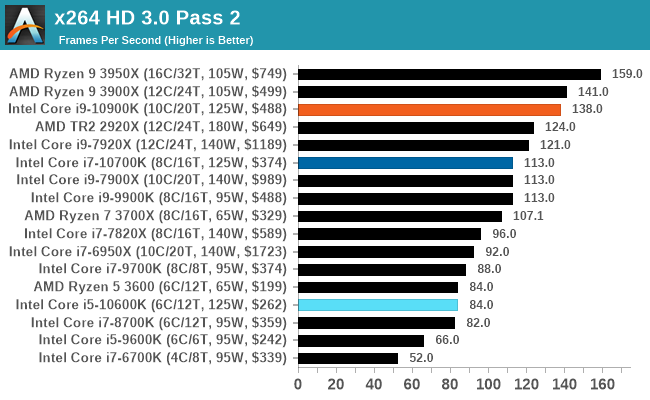










220 Comments
View All Comments
SKiT_R31 - Wednesday, May 20, 2020 - link
Intel never left "the top". Top of 720p low graphics settings, by a single percentage margin. Totally worth 50% higher price.silencer12 - Saturday, May 23, 2020 - link
Give it more than 3 yearstracker1 - Wednesday, May 20, 2020 - link
AMD has already shifted their pricing quite a bit from launch in anticipation of this... is it clearly a better option, for most people... unless you literally only care about gaming, then a 10900K or 10700K might be an okay option at their respective price points and only if you're using at least an RTX 2080 Super. If you're going anything lower on GPU, then AMD is probably the better option all the way around (and you'll probably save a bit on your annual power bill as a result).VoraciousGorak - Wednesday, May 20, 2020 - link
Finally, a sane product stack from Intel with regards to naming versus core/thread count.Hifihedgehog - Wednesday, May 20, 2020 - link
Sane and thermal meltdown don't mix.ElvenLemming - Wednesday, May 20, 2020 - link
Unfortunate that their product stack finally makes sense now that the name sounds so stupid I get angry every time I read it.Spunjji - Tuesday, May 26, 2020 - link
Whether it's "Eye-Nine Ten-Nine-Hundred-Kay" or "Eye-Nine Ten-Thousand-Nine-Hundred-Kay", it sounds equally daft.tipoo - Wednesday, May 20, 2020 - link
Chasing clocks and high power to counter AMD. Ah, Netburst, good times. Ish.WaltC - Wednesday, May 20, 2020 - link
I had forgotten Netburst...;) "The Intel CPU that accelerated the Internet"! Thanks for the laugh!trparky - Wednesday, May 20, 2020 - link
Yep, I agree.